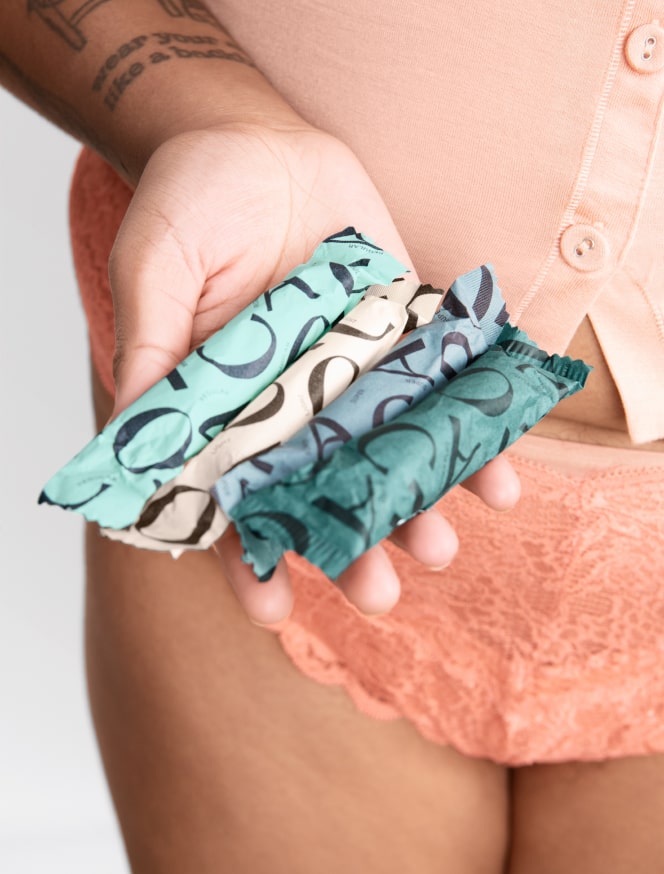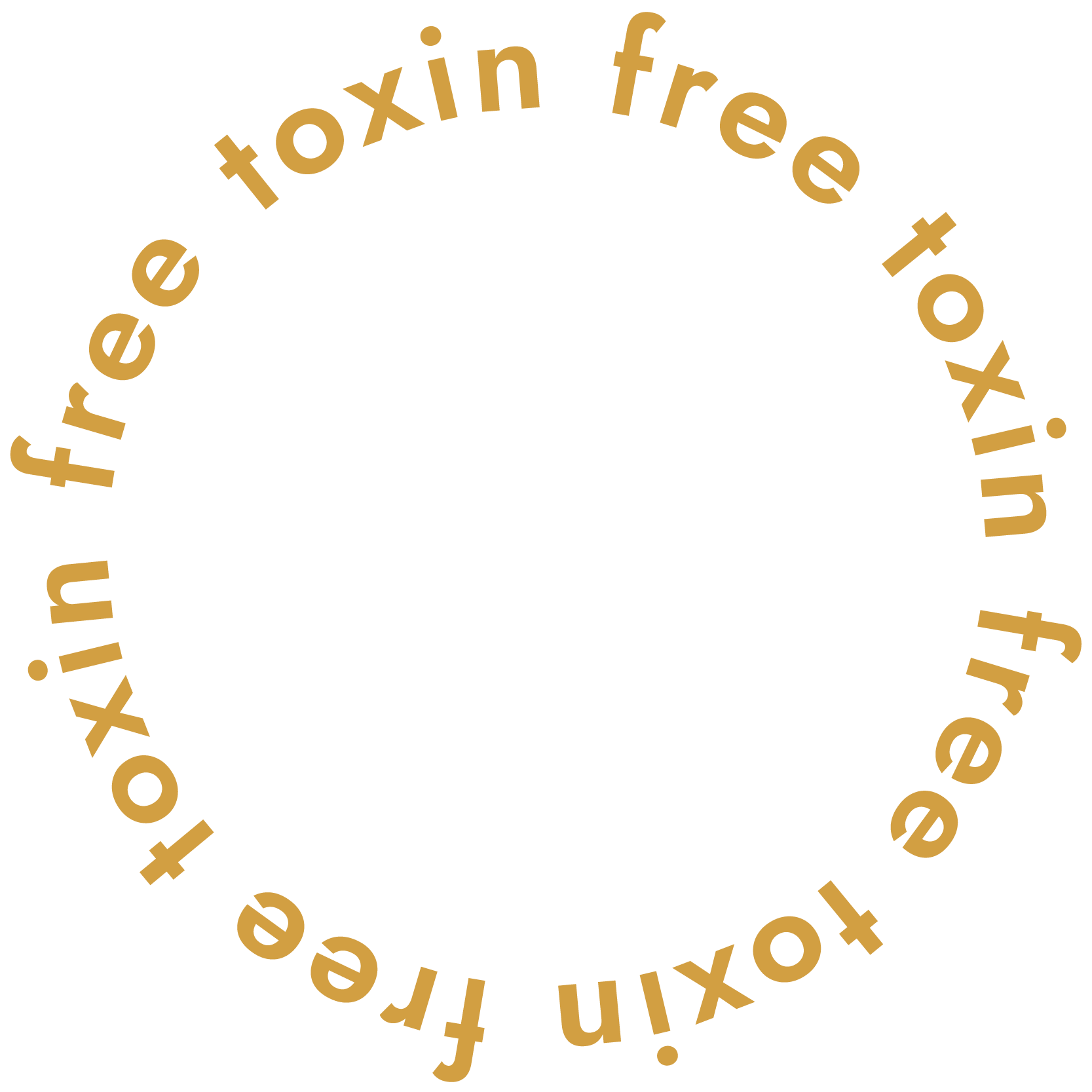Apple Podcasts | Spotify
Over 16 different heavy metals were found in tampons being sold in multiple countries, including the U.S. recently rocked news outlets. This brings into question how to find safe menstrual products that don’t contain toxic chemicals. Today, I’m breaking down a groundbreaking study from Environment International, revealing that both conventional and organic tampons sold in the U.S. and Europe contain 16 different heavy metals.
From lead-laden non-organic brands to arsenic hiding in organic ones, we trace these contaminants to intentional additives and environmental pollution. Unfortunately, ingredient transparency is limited as tampons are classified as medical devices.
But what are your other options for safe menstrual products? So many of us have become so accustomed to tampons that switching up our routines will take a moment. You want to find the option that makes sense with your lifestyle, fits your budget, and feels comfortable. So let’s talk about it!
Is a GOTS certification necessary? What even is a GOTS certification? We’ll cover all of your burning questions!
In this episode, we’re chatting about:
- Why heavy metals in tampons matter to your health
- The science behind the study that found these metals
- Why are heavy metals in tampons?
- What are some safe menstrual products?
Environmental International Study
There was major news coverage over the past week about a study that was released that showed there are 16 different heavy metals found in tampons. It included both conventional cotton and organic tampons, which had everyone wondering how this was even possible.
I want to start by saying that the study published in Environment International is the first study to show the level of heavy metals found in tampons. Think about how many decades women have been using tampons. Anything that goes into a vagina goes straight into the bloodstream.
What did the study actually say? Researchers evaluated the levels of 16 different heavy metals, including arsenic, in 30 tampons from 14 brands and 18 product lines that are sold across the U.S. and Europe. They didn’t name the brands, which I’m bummed about. But they did say they were a mix of big brand name store branded options and a few online, and it was a mix of organic and non-organic.
The study found measurable concentrations of all 16 heavy metals assessed, including lead, arsenic, and cadmium. I think everybody knows these are things you don’t want to be putting in your vagina. There were differences in the organic versus non-organic and what they found was the non-organic tampons had much higher concentrations of lead, but the organic tampons had higher concentrations of arsenic. No category had consistently lower concentrations of all the heavy metals.
The Issue of Consumer Protection
We have very little consumer protection. Companies are allowed to put personal care products on the market without being required to show that they’re safe. This is another example of why we have to be diligent as consumers. In America, tampons are considered medical devices. One of the hard things about being considered a medical device is it means they’re not required to tell you what the ingredients are, which makes shopping for tampons very difficult. There can be a lot of ingredients in a tampon that aren’t listed on the label.
Even though this is the first time heavy metals have been tested in tampons, it’s not the first time tampons have been tested for contaminants. We have a lot of studies showing that tampons have:
- Dioxins
- Polycyclic aromatic hydrocarbons (which come from petroleum-based ingredients)
- Synthetic fragrances
- Phthalates (endocrine disruptors)
- Parabens (more endocrine disruptors)
- Bisphenols
- Glyphosate
- Flame retardants
- Titanium dioxide
A host of toxins can be found in tampons, including heavy metals.
How Heavy Metals Get Into Tampons
Why are there heavy metals in tampons? Where are they coming from? There are two ways heavy metals get into tampons.
The first way is that they’re intentionally added. Manufacturers intentionally put products and ingredients into tampons with heavy metals. These are things like:
- Whitening
- Antimicrobial purposes
- Odor reduction
- Lubrication
- Petroleum derived pigments
The other way heavy metals get into tampons is just because they exist. Cotton is grown in the ground and there are heavy metals in our soil. We live in a polluted world. All of these industries put contaminants into the air. Heavy metals go up into the air and they get deposited down into our dirt. It’s everywhere. We’ve contaminated pretty much everything. When plants grow in soil, they bioaccumulate all of these heavy metals. Cotton plants in particular easily absorb these metals through the soil. As a result, when you harvest cotton, you get those heavy metals into the actual end product, which is those cotton tampons.
Depending on where farms are located, you can have this heavy metal contamination on organic farms. There are a lot of things farms can do to decrease the amount of heavy metals. In fact, it’s been shown that the more crops you grow rotationally, you can decrease the amount of heavy metal in the soil, especially if you are regeneratively farming.
Safe Menstrual Products
Where do you look for toxin-free tampons? Buying organic tampons isn’t enough.
If you want to find a brand with very strict testing standards for things like lead and they’re held to a certification, look for an organic cotton tampon company that is GOTS certified as an organic cotton. Standards and requirements exist for GOTS certification that are above and beyond any U.S. certification for organic products.
If you feel uncomfortable putting anything that has even trace amounts of heavy metals in your vagina, try reusable period products. I have a section in my toxin-free shopping guide for period products. It has my favorite cups, discs, and period underwear, which are safe menstrual products. What I hope comes from all this is our regulatory agencies take this seriously. It is time to regulate what is being put in menstrual products. It should have been done 50 years ago, and maybe this study is going to be the catalyst to get that accomplished.
If you enjoyed this week’s episode, please:
- Leave a positive review or rating wherever you listen
- Shop toxin-free products on my Toxin Free Shopping Guide
- Download your free Tossing the Toxins Guide
- Post a screenshot, share what you loved, and tag me on Instagram @wendy_toxinfreeish
- Want to ask me a question to get answered on the podcast? Leave me a voice message here.
Related Episodes:
Episode 3: Cycle Syncing: Honoring the Phases of Menstruation
Episode 7: Making the Switch to Toxin-Free Period Products
Episode 56: Stanley Cup Maker Sued Over Lead Concerns: How to Protect Yourself From Lead Poisoning
Episode 72: The Only at-Home Lead Detection Kit You Need to Prevent Lead Poisoning in Kids with Eric Ritter


+ show Comments
- Hide Comments